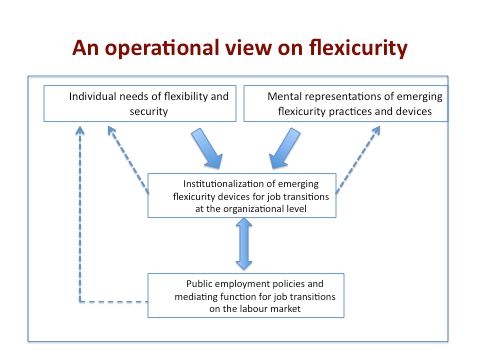Integrated
presentation of the research project

A better understanding of flexibility and security needs is certainly a first step in the perspective of a more operational concept of flexicurity. But it is also crucial to undertake a detailed analysis of the various attempts to reconcile flexibility/security at the organizational level, particularly when they concern job transitions. Some of these initiatives may be legal and regulatory devices (collective agreements, decrees, laws). But most of them appear to be emerging inter-organizational practices, based either on job pooling or job posting principles. We can of course examine the extent to which these less institutionalized devices seem to satisfy immediate needs of flexibility and security emanating from the various stakeholders concerned, even if they do not always respect existing regulations. But we have also to pay attention to the “perverse” effects they may produce. Especially when the power relationships appear asymmetrical, they can end up in unbalanced situations untenable in the long term because they reinforce the precarious position of certain categories of actors. It is thus important to preserve the public interest and to avoid that emergent practices, based on self-regulation, lead to a legal black hole. The role of third-party actors seems to be crucial but one must admit that until now, few research is available on the sustainability of emerging flexicurity practices at the organizational level (Regalia, 2006). An in-depth exploration of the emerging and deliberate attempts to reconcile flexibility and security at the organizational level is thus a second important challenge of the proposed research project (WP2). Thanks to the actor-network theory and the institutional entrepreneurship theory frameworks, we will scrutinize the conditions under which such initiatives are or can be institutionalized. Management scientists (LENTIC) and sociologists (CRIS) will be here working together.
Making the concept of flexicurity more operational does not only imply exploring the needs of the diverse stakeholders concerned and the answers given to them at the organizational level. It also leads to envisaging the evolutions occurring on the labour market level. Indeed, the various attempts to reconcile flexibility and security do not simply rely on “traditional” actors (employers, unions, public agencies): they imply the development of new mediating roles aimed at accompanying job transitions, negotiating compromises and facilitating fluider combinations between labour demand and supply. What kind of actors may take in charge such new roles? What are the specificities of public mediators (in terms of methods, targets, professional ethics, etc.) in a context of radical redefinition of the European Social State? More generally, the proposed research project will decipher the components and the main effects of mediating actionsat the labour market level (WP3). The sociology of conventions and the economic sociology will help us understanding the conditions under which mediators can contribute to a long-lasting and balanced design of new social compromises.We will also pay attention to the consequences of these mediating roles on the expression of needs: are they stimulating new requests in terms of flexibility and/or security? Converseley, are they choking other needs? How can the new social regulation modes preserve the public interest? A cross-fertilization of psychological, managerial and sociological regards coming from ValoRH, LENTIC and CRIS will be here needed but given the questions permanently addressed to the legal framework, a close cooperation with experts in law and philosophy will also be established, at different steps of the project, via sub-contracts with colleagues from other Universities.